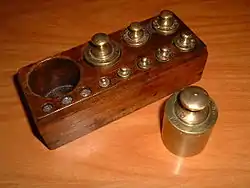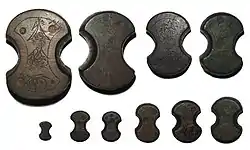分銅
Japanese

分銅: Western-style fundō.

分銅: the fundō family crest.
Etymology 1
| Kanji in this term | |
|---|---|
| 分 | 銅 |
| ふん Grade: 2 |
どう Grade: 5 |
| on’yomi | |
Uncertain. Given the kan'yōyomi of dō for the 銅 character, probably a Japanese coinage from Middle Chinese-derived elements, as a compound of 分 (fun, a unit of weight, roughly 375 milligrams) + 銅 (dō, “copper”).
Noun
分銅 (hiragana ふんどう, rōmaji fundō)
- a metal weight, often made of copper, used in a balance scale; traditionally had a kind of hourglass shape
- any gold or silver ingot cast in an hourglass shape; such ingots were formerly kept as emergency savings
- (obsolete, slang) a 二朱銀 (nishugin, “Edo-period coin of refined silver”)
- any other weight used with a balance scale
- a 家紋 (kamon, “family crest”) in the shape of a stylized fundō weight
Derived terms
- 分銅座 (Fundō-za): the weights guild: tasked by the Edo shogunate with standardizing weights and controlling their manufacture and distribution; abolished in February 1876
- 分銅桜 (fundō-zakura): a 家紋 (kamon, “family crest”) in the shape of a 桜 (sakura, “cherry blossom”), with each petal depicted using a fundō shape
Etymology 2
| Kanji in this term | |
|---|---|
| 分 | 銅 |
| ふん Grade: 2 |
どん Grade: 5 |
| Irregular | |
Alteration from fundō. Non-standard reading of don for 銅 may indicate influence from early Mandarin or Cantonese readings (modern tóng and tung²), or perhaps more likely, influence from an early version of Korean 銅 (dong).
Noun
分銅 (hiragana ふんどん, rōmaji fundon)
This article is issued from Wiktionary. The text is licensed under Creative Commons - Attribution - Sharealike. Additional terms may apply for the media files.
